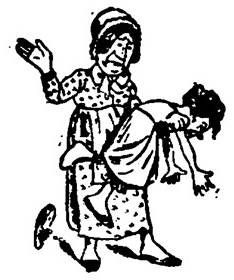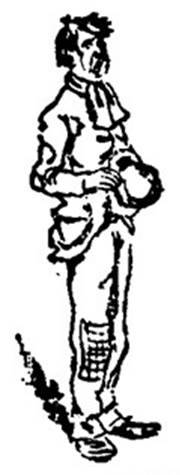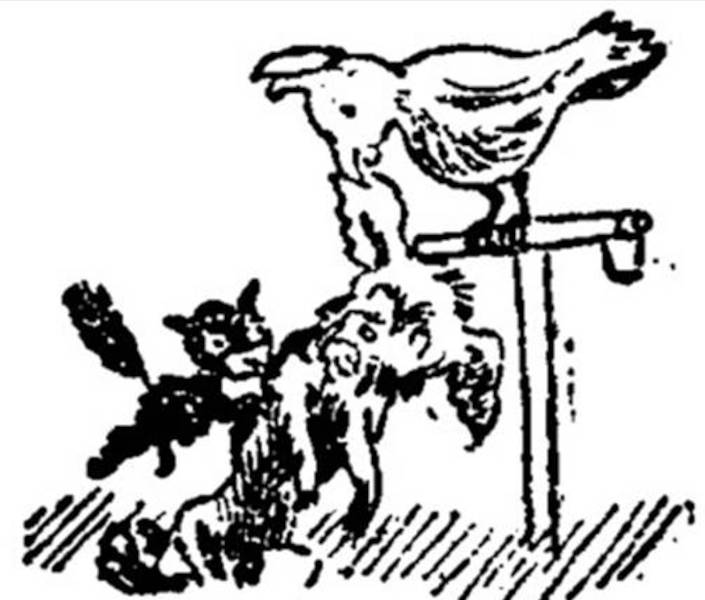This article has been transcribed from a copy of the Cardiff Times in the online collection of scanned Welsh newspapers 1804-1919 in the National Library of Wales, with grateful recognition of the free access accorded to all readers. Where necessary paragraph breaks have been introduced for easier reading.
There is a long tradition of authors and musicians complaining about street noises from Tudor times onwards because of iron-clad wheels on cobbles, the cracking of whips, and a great deal of vociferation, particularly the street cries of salespeople. There is no doubt that streets in the centre of large towns were noisier in Samuel’s day than at any time since, and he compares the noise to that in Pandemomium in Miton’s Paradise Lost. The songs and hymns mentioned in this article are identified in the essay accompanying this series. — David Skilton

Kippers
It is within your experience, sir, that I am occasionally somewhat late in producing for you those burning and immortal thoughts for which I periodically receive your shekels — at any rate, it is within my own ken, sir, that I am late in the matter of ‘copy’ The grimy and perspiring boys, the irate missives, you despatch to me all remind me of my shortcomings in this particular, but you little know, sir, when you thus pester me how much of personal suffering I am at the time undergoing, or those burning sympathies of which I know you to be fully capable would at once be aroused, and you would shed tears of contrition when you remembered how galling had been your reproaches heaped upon the bald and unprotected head of your Samuel. I have kept silence long enough, sir, I must speak out boldly. The trouble which diverts my attention from serious study and literary productiveness comes from without, and in many shapes — I am, in fact, a victim of a perfect host of ‘crying’ (I use this word in its most literal sense) street nuisances. I am normally a nervous man, sir, and one whose mind but too frequently goes off at a tangent when it is so directed by outside influences. As you know, sir, I am the occupant of a dwelling on the outskirts of the town (you needn't chuck my address about too much in your revision of this proof), and from early morn to dewy eve are my ears saluted and tortured by every variety of distracting sound known to Pandemonium — or anywhere else. I don't quite know where Pandemonium is, but you can get a directory or make enquiries where you've to change to get there.
My pangs begin in the early morning, sir, about cock-crow — literally cock-crow. A neighbour of mine possesses a rooster which is palpably the best on record for crowing; indeed, I have come to the conclusion that it must have entered itself for a contest, for which it is practising. I complained to its owner, sir, and intimated that I should wring that cock's neck, as it had wrung my feelings. In return, I was informed that if I tried on such fowl proceedings my own neck would suffer, without the intervention of Mr Berry, of Bradford [the hangman]. After the cock has had a turn, a young person who is practising the bugle begins to tune up, and for hours does he go bugling me into a state of desperation. He, in one practising bout calls enough troops to arms to conquer the world almost - indeed. he must, in my judgment, be attempting to call up all the legions that are dead and have gone before. I may delicately intimate to you here, sir, that his ‘blasts’ are a fitting accompaniment to the Ianguage I myself utter when I hear him. His bugle is, I have reason to believe, cracked - I know that I shall soon be so if he goes on in his mad bugling way. When he has done, sir, a young person who goes to his work whistling and the hawkers of the morning papers begin. ‘aily News’ then becomes the cry, and this or the bugle to call upon the scene a whole inferno of voiceful, incoherent howlers and dervishes. The concert usually commences just as I am starting work, and getting my tangled thoughts into pensive order, with a sudden yell of ‘Oh, Mick.’ I am free to confess that at the outset this cry afforded me food for surmise. I started with the theory that perhaps it was some distracted ‘Colleen’ crying vainly through the street in reproachful, heart-broken search of a faithless Hibernian swain who rejoiced in the name of Michael, which name she had familiarly and endearingly abbreviated into ‘Mick.’ Time, sir, disillusionised me, for I soon found that changes in ‘Oh, Mick’ were sung at all hours of the day by an apparently endless variety of persons, most of whom were of the male sex. ‘Ole Meek!’ ‘Ourmick!’ and ‘Meek Want’ were the usual and pleasing variations indulged in by the street haunters in question. Times out of number had I heard this sorrowful cry die out gradually in mournful cadences in the next street, till at length I was led to make inquiries, only to find that what was intended to be conveyed — and purveyed — was ‘Old Milk.’ Now, had a man been selling hot potatoes, and distorted his cry, I should have surmised that his incoherency arose from his having one of his own wares — and a ‘hot 'un’ — in his mouth at the time of his giving utterance to his sentiments, but I could not imagine milk having such an effect. I was soon to discover that frequent repetition of the same formula produces a sort of elocutionary imp receptiveness; I was soon to discover that eccentricity in the rendering of any one, given simple cry was almost to be regarded as a business merit, it having the effect of exciting the curiosity of the auditor as to what particular article was intended to be vended.

Music by ‘Handel.’
Then in endeavouring to supply you with my notions about men and things for quite three months or so this summer, I have at every tick of the clock almost, day in day out, morning, noon, and night, been greeted with yells which might have arisen from cannibalistic persons disappointed in a nice dainty dish of white sailor-man or missionary, served up hot. These cries might be roughly and variously interpreted into —'Threeshid mack-l l-l’ ‘Mackyah!’ ‘Ackyow’ — anything you like almost. No wonder that some of the mackerel sold by these vendors soon goes bad; it might well, hearing such a cry us that. Then, sir, as the, hours speed by, comes the fell piano-organ man, with ‘Two lovely black eyes’ (would that he had them). ‘He's got 'em on’ (would that he had — and badly, too), and ‘All very Fine and Large’ — like his own monstrous and abominable impudence.

‘Daily News’
Ably reinforced is he by squeaking women with tripe or shrimps; hoarse men who want bones, and soon should be amongst the ‘bones’ in the nearest cemetery had I my way [;] murky men whose mission it is to clean flues (they are very fluent in their cries), and who leave a trail of soot as they walk; larcenous looking men with clothes pegs (may they soon ‘peg out’) and props –‘'S props’ is their cry — boys with ‘speshul dishun’ and cork-screw voices; men in endless profusion with ‘rhubub,’ whatever that may be; dirty and malodorous men with ‘kippers;’ ruddy men with radishes; loud and self-assertive men with chips; grimy men in a long string with ‘coal’; and ‘vegetable’ men of every size and make. These, during the time when that blessed institution the School Board does not claim the juvenile population, I have yells, shrieks and howls in every species of bad treble. I have sudden shrieks betokening trifling accidents, long-sustained yells imparting the application of a strong hand to some portion of the juvenile anatomy; I have hideous howls giving testimony to the deprivation of liberty; I have — well, sir, I have a racking headache, a wild and fierce desire to rush out and do what the bard calls ‘damned slaughter.’ I have an ardent and impious desire to pray that all my fellow-mortals may be struck with permanent speechlessness. I have a desire to send to his fathers the boy who cries ‘Speshul' with horrible iteration, and I begin to hate my species when the fried fish man and the man who carries a steaming can, and who shouts ‘peas all ‘ot,’ come round. Some night when my olfactory nerves tell me that the former man is coming round the corner some five hundred yards off, I shall rush out and do something desperate and dire — perhaps make him eat his own particular dainties. Would that I could stew him in the mysterious fat he appears to employ in cooking his wares.


‘Help your brother when he’s down.’
And then, sir, think of the rack-like tortures inflicted by street vocalists, especially when there comes a whole family of ten of them, each member of the said family singing ‘Hold the Fort’ (would that they would hold their tongues) in a somewhat different key or tune. There is one vocalist, sir, who goads me to desperation. He sings spasmodically, as I might call it. Suppose the line is, ‘We shall meet on that beautiful shore,’ he sings the word ‘meet’ (you would almost suspect him of being a cat's meat man by the way he renders it) in front of number 5 and the word ‘shoor’ (so rendered by him) opposite number 25. He looks up the street and sings one word, then he turns round and looks down the ditto, and sings another, and so on. When the vill[ai]nous vocalists are not grinding out ditties of a devotional order, they indulge in cheap and ungrammatical sentiment, and sing such refrains as ‘Help a brother when he's down.’ I once, sir, to digress, tried to help ‘brother when he was down.’ He was in the gutter, and a nice mess he made of a new suit of mine. No sooner was he up than he invited me to come out and throw him out.’ My neighbours too, sir, add to the Babel of sounds. One of them has a parrot, which swears with equal freedom, fluency, and effect in English, Dutch, and Spanish. A pet dog tried to get hold of it the other day, and a cat, possibly disgusted with the parrot's perpetual blasphemies, joined in the conflict. Fur, feathers, and hair flew all over the neighbourhood, and a woman who was much alarmed ran for the fire escape. Can you wonder sir, that with all this to endure, your Samuel is sometimes distracted But I move, sir, I shall move quickly — in the dead of night, in fact. But I’ll write you, with my address, anon — though, of course, not anonymously.

A triangular duel
Last modified 12 December 2021